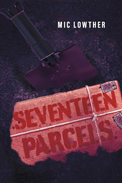
 |
Xander Moorhouse spent a lifetime building wealth. In fact, his relationship with his three children suffered due to his dedication to business pursuits. No one knew his net worth, which is how he liked it. After his wife passed and he slowed into retirement, he moved his wealth offshore and came up with a plan to deliver his children a final message and tell his story before they would get any of his money. Part of this plan was to have his lawyer hire a driver to hide seventeen packages around the United States. Austin, famed for his delivery skills, was interviewed for the task. The job presented to him by the lawyer was odd and interesting and paid well, so he said yes. A little less than two years later, the task was done. Meanwhile, Xander and his children developed a renewed relationship through travel, and they all worked together to open an ice cream parlor. When he passed, his lawyer told them about the seventeen parcels and the rules to collect them. The children decided to hire Austin to help them retrieve the packages.
Lowther’s novel is a bit of a quest or travel narrative with elements of an adventurous scavenger hunt. Readers familiar with the television series The Amazing Race will find many similarities as the participants have to navigate the journey itself, locals, and some physical/mental challenges. Additionally, Austin in the book's first half and the others in the second half visit American landmarks and restaurants and order a variety of drinks. Lowther uses these times as an opportunity to discuss proper spirits and the correct way to make several cocktails. This interesting addition feels akin to the manner in which cozy culinary mysteries, like Ginger Bolton’s Deputy Donuts series, share recipes and elaborate on the food they eat. Although Lowther doesn’t devote a lot of time to this inclusion, it does broaden his book’s ability to engage the reader and keep them interested.
The writing throughout the book is clear and mostly unadorned, as Lowther’s focus is on telling the reader about the delivery of each parcel to its hiding spot and subsequent retrieval by the group. Once all the parcels are collected, Lowther again uses the rules laid down by Xander to reveal Xander’s story more fully and give context to why he created the parcel system. There is a side story about a thief named Sydney, which appears likely to create problems but actually ends up being irrelevant to the main plot. Since the book's first half is spent following Austin around to hide packages, readers are in on the secret of where everything is hidden, even as the family struggles to figure out where the parcels might be. Readers who like the idea of a cross-country road trip, especially those who prefer cozy mysteries to gritty thrillers, will find Lowther’s book a clean, inoffensive read with a happy ending and numerous visits to known and likely unknown parts of America. The book may even inspire the reader to plan their own cross-country adventure.